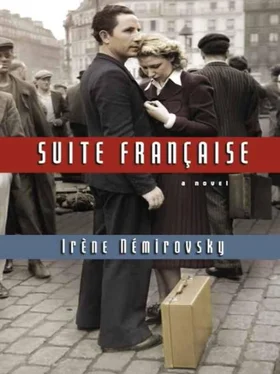Irène Némirovsky - Suite Française
Здесь есть возможность читать онлайн «Irène Némirovsky - Suite Française» весь текст электронной книги совершенно бесплатно (целиком полную версию без сокращений). В некоторых случаях можно слушать аудио, скачать через торрент в формате fb2 и присутствует краткое содержание. Жанр: Историческая проза, на английском языке. Описание произведения, (предисловие) а так же отзывы посетителей доступны на портале библиотеки ЛибКат.
- Название:Suite Française
- Автор:
- Жанр:
- Год:неизвестен
- ISBN:нет данных
- Рейтинг книги:4 / 5. Голосов: 1
-
Избранное:Добавить в избранное
- Отзывы:
-
Ваша оценка:
- 80
- 1
- 2
- 3
- 4
- 5
Suite Française: краткое содержание, описание и аннотация
Предлагаем к чтению аннотацию, описание, краткое содержание или предисловие (зависит от того, что написал сам автор книги «Suite Française»). Если вы не нашли необходимую информацию о книге — напишите в комментариях, мы постараемся отыскать её.
"A book of exceptional literary quality… it has the kind of intimacy found in the diary of Anne Frank."-The Times Literary Supplement
"Heroic… a novel about a nightmare in which the author is entirely embedded."-ANITA BROOKNER, The Spectator
"An exceptionally forceful and frank testimony… a real find. A masterpiece."-L'Express
"Remarkable as the story of the publication of Suite Française is, it will finally be of anecdotal interest compared with the importance of the book. Here is the work of a fine novelist at the top of her form, writing about the fate of her adopted country with a pitiless clarity."-Evening Standard
Suite Française — читать онлайн бесплатно полную книгу (весь текст) целиком
Ниже представлен текст книги, разбитый по страницам. Система сохранения места последней прочитанной страницы, позволяет с удобством читать онлайн бесплатно книгу «Suite Française», без необходимости каждый раз заново искать на чём Вы остановились. Поставьте закладку, и сможете в любой момент перейти на страницу, на которой закончили чтение.
Интервал:
Закладка:
As for the Germans, well, they were better informed. They now understood what the commotion was about, why there had been whistles in the night, and why, the evening before, they had been forbidden to go out after eight o'clock: "They must have been moving the body and they didn't want us to see." In the cafés, the Germans talked quietly among themselves. They too had the impression it was all horrible, unreal. For three months they had lived alongside these Frenchmen; they had mixed with them; they had done them no harm; they had even managed, thanks to their consideration and good behaviour, to establish a humane relationship with them. Now, the act of one madman made them doubt everything. Yet it wasn't so much the crime that affected them as the solidarity, the complicity they could sense all around them (in the end, for a man to elude an entire regiment hot on his heels meant that everyone must be helping him, hiding him, feeding him; unless, of course, he was hiding in the woods-but the soldiers had spent the entire night searching them). "So, if a Frenchman kills me tomorrow," each soldier was thinking, "me they welcome in their house, me they smile at, who has a place at their dinner table and is allowed to sit their children on my knee… there won't be a single person who'll feel sorry and speak up for me, and everyone will do their best to hide the murderer!" These peaceful country folk with their impassive faces, these women who smiled at them, who had chatted to them yesterday but today walked by embarrassed, avoiding their eye, they were nothing but a group of enemies. They could hardly believe it; they were such nice people… Lacombe, the shoemaker, who had offered a bottle of white wine to the Germans the week before because his daughter had just received her high school diploma and he didn't know how else to express his joy; Georges, the miller, a veteran of the last war, who had said, "Peace as soon as possible and everyone in his own country. That's all we Frenchmen want"; the young women, always eager to laugh, to sing, to share a secret kiss, were they now and for ever to be enemies?
The Frenchmen, meanwhile, were wondering, "That Willy who asked permission to kiss my kid, saying he had one the same age in Bavaria, that Fritz who helped me take care of my sick husband, that Erwald who thinks France is such a beautiful country, and that other one I saw standing in front of the portrait of my father who was killed in 1915… if tomorrow he was given the order, he'd arrest me, he'd kill me with his own hands without thinking twice? War… yes, everyone knows what war is like. But occupation is more terrible in a way, because people get used to one another. We tell ourselves, 'They're just like us, after all,' but they're not at all the same. We're two different species, irreconcilable, enemies forever."
Madame Angellier knew them so well, these country people, that she felt she could look at their faces and read their minds. She sniggered. She hadn't been taken in, not her! She hadn't let herself be bought. For everyone in the village of Bussy had a price, just like in the rest of France. The Germans gave money to some of them (the wine merchants who charged soldiers of the Wehrmacht a hundred francs for a bottle of Chablis, the farmers who got five francs each for their eggs), to others (the young people, the women) they gave pleasure. The villagers were no longer bored since the Germans arrived. Finally they had someone to talk to. God, even her own daughter-in-law… She half closed her eyes and raised her white, translucent hand to cover her lowered eyelids, as if she were trying not to look at a naked body. Yes, the Germans thought they could buy tolerance and forgetfulness that way. And they had.
Bitterly, Madame Angellier made a mental inventory of all the important people in the town. All of them had yielded, all of them had let themselves be seduced: the Montmorts… they entertained the Germans in their own home; she'd heard that the Germans were organising a celebration in the Viscount's grounds, by the lake. Madame de Montmort told everyone who would listen that she was outraged, that she would close all the windows so she couldn't hear the music or see the sparklers beneath the trees. But when Lieutenant von Falk and Bonnet, the interpreter, had gone to see her about borrowing chairs, bowls and tablecloths, she'd spent nearly two hours with them. Madame Angellier had heard this from the cook who'd heard it from the groundsman. These aristocrats were part foreigner themselves, after all, if you looked closely enough. Wasn't it true that through their veins ran the foreign blood of Bavaria, Prussia (abomination!) and the Rhineland? Aristocrats intermarried without a thought for national boundaries. But, come to think of it, the upper middle classes weren't much better. People whispered the names of collaborators (and their names were broadcast loudly on English radio every night): the Maltêtes of Lyon, the Péricands of Paris, the Corbin Bank… and others as well…
Madame Angellier came to feel that she was a race apart-staunch, as implacable as a fortress. Alas, it was the only fortress that remained standing in France, but nothing could bring it down, for its bastions were made, not of stone, not of flesh, not of blood, but of those most intangible and invincible things in the world: love and hate.
She walked quickly and silently up and down the room. "There's no point in closing my eyes," she murmured. "Lucile is ready to fall into the arms of that German." There was nothing she could do about it. Men had weapons; they knew how to fight. All she could do was spy on them, watch them, listen to them… keep her ears open for the sound of footsteps, a sigh in the silence of the night. So that these things, at least, would be neither forgiven nor forgotten, so that when Gaston got back… She quivered with intense joy. God, how she despised Lucile! When everyone was finally asleep in the house, the old woman did what she called "her rounds." Nothing escaped her. She counted the cigarette stubs in the ashtrays that had traces of lipstick on them; she silently picked up a crumpled, perfumed handkerchief, a flower, an open book. She often heard the piano or the German's low, soft voice as he hummed, stressing some musical phrase.
The piano… How could anyone like music? Every note seemed to grate on her exposed nerves and made her groan. She preferred the long conversations that she could just about hear by leaning out of the window above the library window they left open on those beautiful summer evenings. She even preferred the silences that fell between them or Lucile's laughter (laughter… when her husband was a prisoner of war! Shameless hussy, bitch, heathen!). Anything was better than music, for music alone can abolish differences of language or culture between two people and evoke something indestructible within them. Madame Angellier sometimes walked up to the German's room. She listened to his breathing, his mild smoker's cough. She crossed the hall where the officer's large green cape hung beneath the stuffed stag's head and slipped some sprigs of heather into his pocket. People said it brought bad luck; she didn't actually believe it herself, but it was worth a try…
For a few days now, two to be exact, the atmosphere in the house had seemed even more ominous. The piano was silent. Madame Angellier had heard Lucile and the cook whispering to each other for a long time. (Is she now betraying me as well?) The church bells began to ring. (Ah, the funeral of the murdered officer…) There were the armed soldiers, the casket, the wreaths of red flowers… The church had been requisitioned. No Frenchman was allowed in. They could hear a choir of excellent voices singing a religious hymn; it was coming from the Chapel of the Virgin. That winter the children had broken a pane of glass during catechism class and it hadn't been replaced. The hymn rose up through this ancient little window set above the altar of the Virgin and obscured by the great branches of the lime tree in the village square. How happily the birds were singing! Now and again, their shrill voices almost drowned out the German hymn. Madame Angellier didn't know the name or age of the dead man. All German Headquarters had said was "an officer of the Wehrmacht." That was enough. He must have been young. They were all young. "Well, it's all over for you now. What can you do? That's war." His mother will eventually understand that, Madame Angellier murmured, nervously fiddling with her black necklace; it was made of jet and ebony, and she'd started wearing it when her husband had died.
Читать дальшеИнтервал:
Закладка:
Похожие книги на «Suite Française»
Представляем Вашему вниманию похожие книги на «Suite Française» списком для выбора. Мы отобрали схожую по названию и смыслу литературу в надежде предоставить читателям больше вариантов отыскать новые, интересные, ещё непрочитанные произведения.
Обсуждение, отзывы о книге «Suite Française» и просто собственные мнения читателей. Оставьте ваши комментарии, напишите, что Вы думаете о произведении, его смысле или главных героях. Укажите что конкретно понравилось, а что нет, и почему Вы так считаете.

![Константин Бальмонт - Константин Бальмонт и поэзия французского языка/Konstantin Balmont et la poésie de langue française [билингва ru-fr]](/books/60875/konstantin-balmont-konstantin-balmont-i-poeziya-francuzskogo-yazyka-konstantin-balmont-et-thumb.webp)










